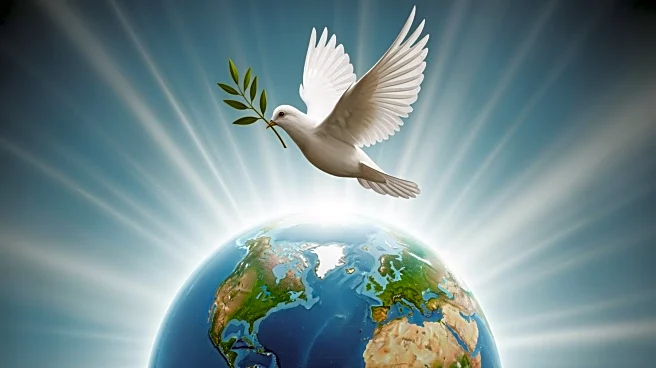What's Happening?
President Donald Trump has called for Russia and Ukraine to 'stop where they are' and cease hostilities following a meeting with Ukrainian President Volodymyr Zelenskyy in Washington, D.C. The discussions,
which included a working lunch, focused on the ongoing conflict and potential diplomatic solutions. Trump emphasized the need for both sides to halt the violence and engage in negotiations, suggesting that a ceasefire is a crucial first step. Zelenskyy expressed hope that Trump would pressure Russian President Vladimir Putin to end the invasion, while also seeking U.S. security guarantees and military support, including Tomahawk missiles. However, Trump was hesitant to commit to providing these weapons, citing the need to maintain U.S. military readiness.
Why It's Important?
The call for a ceasefire by President Trump highlights the ongoing international efforts to resolve the conflict between Russia and Ukraine, which has significant implications for global security and stability. The potential involvement of the U.S. in providing military support to Ukraine could alter the dynamics of the conflict, impacting U.S.-Russia relations and NATO's strategic posture. The situation also affects European security, as nations within the coalition of the willing may need to reassess their defense strategies. The outcome of these diplomatic efforts could influence future geopolitical alignments and the balance of power in Eastern Europe.
What's Next?
President Trump and President Putin are expected to meet in Budapest within the next two weeks to discuss the conflict further. This meeting could be pivotal in determining the next steps in the diplomatic process. Ukrainian advocacy groups remain skeptical about the effectiveness of these talks, citing past insincerity from Putin. Meanwhile, the U.S. and NATO allies continue to warn Russia of potential consequences if the aggression persists, including increased military support for Ukraine. The international community will be closely monitoring these developments, as they could lead to shifts in military strategies and alliances.
Beyond the Headlines
The ethical and legal dimensions of the conflict are significant, as the war has resulted in substantial civilian casualties and humanitarian crises. The call for a ceasefire and negotiations raises questions about territorial integrity and the right to self-defense. Additionally, the potential provision of advanced weaponry to Ukraine by the U.S. could set precedents for future conflicts, influencing international arms policies and defense agreements. The long-term impact on U.S.-Russia relations and global diplomatic norms remains uncertain.










